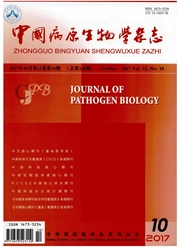

 中文摘要:
中文摘要:
目的 表达、纯化梅毒螺旋体(Tp)重组蛋白Tp0259(rTp0259),鉴定其免疫原性,并探讨其在梅毒血清诊断中的价值。方法 PCR扩增tp0259基因,构建pET-28a(+)/Tp0259原核表达载体,转化至E.coli BL21中诱导表达。采用Ni-NTA亲和层析法纯化重组蛋白,并进行Western blot鉴定。以重组蛋白Tp0259为抗原,采用Western blot方法检测梅毒患者血清(一期梅毒患者血清21份,二期梅毒患者血清13份,潜伏梅毒患者血清6份,并与梅毒诊断金标准比较)。结果 PCR扩增获得600bp左右大小的目的基因片段并成功构建原核表达载体pET28a-Tp0259,经诱导高效表达分子质量单位为28ku的重组蛋白。Western blot证实该重组蛋白为Tp0259假定蛋白,能被梅毒患者血清识别。以Tp0259为抗原采用Western blot检测梅毒患者血清特异性抗体结果与梅毒诊断金标准(临床症状、病史结合血清学诊断方法)间的κ值为0.944,表明这两种方法检测结果的一致性较好。结论成功表达、纯化了可溶性rTp0259,该蛋白具有良好的免疫反应性并具有较高的血清学诊断价值。
 英文摘要:
英文摘要:
Objectives To express and purify a recombinant form of the protein Tp0259 (rTp0259) of Treponema pallidum and to further investigate its potential value in the serodiagnosis of syphilis. Methods The tp0259 gene was amplified with PCR. The prokaryotic expression vector pET-28a/ Tp0259 was constructed and the expression of rTp0259 was induced with isopropyl β-D-1 thiogalactopyranoside (IPTG). rTp0259 was purified with Ni-NTA chromatography and identified with a Western blot assay. A Western blot assay based on rTp0259 was used to detect T. pallidum in serum samples from patients with syphilis, including 21 with primary syphilis, 13 with secondary syphilis, and 6 with latent syphilis. Results The prokaryotic expression vector pET-28a/ Tp0259 was successfully constructed and a soluble recombinant protein with a molecular mass of approximately 28 ku was efficiently expressed. A Western blot assay indicated that the purified protein was specifically recognized by sera from patients with syphilis. Moreover, the overall percentage of agreement between the Western blot assay and the gold standard (clinical diagnosis) was 97.2% and the κ value was 0. 944. Conclusion rTp0259 has good immunoreactivity and could potentially be used to develop new immunodiagnostic tests for syphilis.
 同期刊论文项目
同期刊论文项目
 同项目期刊论文
同项目期刊论文
 期刊信息
期刊信息
